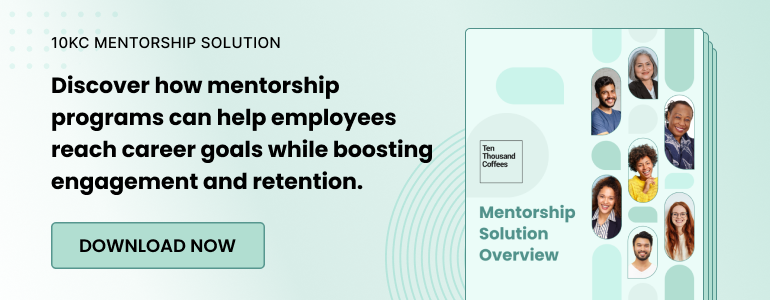Corporate mentorship is a driving force that can propel both your business and your employees towards growth and success. When executed well, mentorship programs cultivate a workforce that's not just proficient but is also diverse, resilient, and fully committed.
While it's common for employee mentorship programs to start with a set of "ground rules," there's a fine line between having a flexible framework and veering into a free-for-all that diminishes impact. The real magic of a mentorship hinges on a strategic foundation laid out by the organization, coupled with the active engagement of both mentor and mentee.
Ready to explore where things might go sideways? Let's navigate through some typical mentoring challenges and solutions.
The importance of mentoring for an organization
Mentoring programs underscore a commitment to employee growth and satisfaction, which can lead to increased retention rates, higher employee engagement, and a more inclusive workplace culture.
Employees engaged in mentoring programs were 49% less likely to leave, according to a study by Randstad, and saved the company $3,000 annually for each participant involved.
“The labor market is really challenging. And for really strong talent and specialized talent, they can get what you're offering in many organizations. But if they have a really deep sense of connection and belonging in the company that you work for, that's what's going to hold them.” - Manisha Burman, EVP and CHRO, CI Financial
WATCH NOW: Mentorship: The Ultimate Tool for Employee Engagement and Development
Mentorship is a way for organizations to invest in their people, not just in terms of professional development but also by showing genuine interest in their overall well-being and career progression. It fosters a profound sense of connection and belonging among employees.
Deloitte's insights affirm the value of employees’ sense of belonging, linking it to a 56% boost in job performance and a 50% drop in turnover risk. Moreover, it correlates with a staggering 167% surge in employer net promoter score, 2X the likelihood of employee raises, an 18X increase in promotions, and a significant 75% reduction in sick days. Needless to say – the impact is impressive.
The impact of a lack of mentoring
Most professionals admit that who you know is as important as skills and experience. Up to 85% of open positions are filled through networking. The absence of formal corporate mentorship programs can prevent the equitable distribution of professional development opportunities within an organization. Without a structure, the journey to finding a mentor often boils down to a mix of luck, existing networks, and, let's face it, personal biases.
This hit-or-miss approach isn't just inconvenient; it sidelines those not in the spotlight—think remote workers, entry-level employees, or folks from underrepresented backgrounds. It puts them at a considerable disadvantage.
Corporate mentorship programs aren’t just vital for individual career progression but also for fostering a cohesive, resilient team dynamic that is aligned with the organization's broader objectives. Essentially, without structured mentorship initiatives, we're not just missing out on individual growth opportunities but also on the chance to nurture a workplace culture that's as inclusive as it is inspiring.

5 mentoring challenges (and solutions) in the workplace
Navigating workplace mentoring programs presents its own set of challenges, from establishing a solid structure to ensuring productive mentor-mentee pairings. Through strategic planning, targeted training, and leveraging technology, organizations can transform these challenges into opportunities for growth and success. Let's explore some common pain points:
1. Lack of structure or strategy
Challenge: A mentoring relationship without a concrete structure or clear objectives can lead to relationships wandering without a clear purpose. This absence of direction not only undermines the value of the program for mentors and mentees but also detracts from the organization's broader goals.
Solution: To counteract this, it’s essential to establish a well-defined mentorship framework that sets expectations, milestones, and objectives for the mentoring relationship. Key considerations for crafting this framework include:
- Ensuring the program supports broader company objectives
- Defining target outcomes related to engagement, retention, talent development, culture, or diversity, equity, and inclusion (DEI) initiatives.
- Getting backing from the top levels of management to underscore the program’s importance.
- Identifying a target audience for the mentorship program, whether it's for early talent, leadership, new employee onboarding, underrepresented diverse employees, or available to everyone.
“Anything that's left to an accident in business usually doesn't work. [...] for those of us that care about talent development, care about inclusion, we need a strategic framework. We need measurement. And that's how leaders often think.” - David Simmonds, SVP, Global Chief Communications and Sustainability Officer, Canada Life.
2. Mismatched mentor-mentee pairings
Challenge: One of the most common stumbling blocks is pairing mentors and mentees whose skills, personalities, or goals do not align well. This mismatch can lead to unproductive relationships, frustration, and disengagement from the program. Or, perhaps you’re unable to make successful pairings because there aren't enough mentors in the first place.
Solution: Move beyond spreadsheets and use algorithms or matching tools that consider career aspirations, personal interests, working styles, and professional development goals. Regularly collecting feedback from participants can also help refine the matching process over time. Not enough mentors for 1:1 pairings? Consider implementing group mentoring to allow one mentor to support many mentees.

3. Insufficient training
Challenge: Mentors and mentees may enter the program with enthusiasm but lack the necessary guidance on how to make the most of their relationship. This can lead to underutilized potential and dissatisfaction.
Solution: Equipping participants with resources such as discussion guides or curriculums and progress tracking tools can ensure that the mentorship remains focused and effective. Offer comprehensive suppurt for both mentors and mentees. Cover best practices for effective communication, goal setting, and providing constructive feedback.
“Stop making people have to be naturally gifted [at mentorship]. That's where platforms like 10KC provide them with the conversation guides, the nudges, all of those experiences so that you can now 10x or 20x the amount of people that are ready to do this because they're enabled.” - Dave Wilkin, CEO, 10KC
4. Time constraints and admin inefficiencies
Challenge: Time is a precious commodity! Participants may have limited bandwidth and struggle to find adequate time for mentoring with their regular duties. The last thing you want is for mentorship to become a negative stressor. And for the mentorship program admins, administrative inefficiencies are a huge time-suck.
Solution: Make time commitments clear, ensuring that mentoring is a part of the workday, not an add-on. And for the love of efficiency, ditch the spreadsheets. Embrace technology that simplifies management, making your mentoring program as seamless as possible. Ensure the program is integrated into employees' regular workflow and everyday tools, rather than creating extra work.
“I’m conscious of the bandwidth of my peers. I'm conscious of my own bandwidth. [...] We need this program, but we also need to invest in a tool that will make this program even more successful and easier to maintain and scale. I was able to really make the case like, hey, I've done the research. [10KC] is the vendor for us because it helps to solve for the barriers that we're experiencing.” - Michelle Rojas, Associate Director of DEI, Spring Health
5. ROI Measurement
Challenge: Measuring the impact of mentoring programs can be tricky, making it hard to justify continued investment or identify areas for improvement.
Solution: Develop clear metrics for success early on, such as retention rates, promotion rates, and participant satisfaction scores. Regular pulse checks through surveys and feedback can provide the narrative behind the numbers, offering insights into what’s working and what’s not. Don’t just measure success; narrate it through the stories of growth and achievement within your organization.
Don’t just measure success; narrate it through the stories of growth and achievement within your organization. Leverage analytics tools to track progress and make data-driven decisions, turning qualitative anecdotes into quantitative data that speaks volumes.
“Being able to make this investment requires a clear ability to talk about the ROI. [...] And so tech enablement through platforms like 10KC make measurement and monitoring pretty seamless in how we do the work.” - Jarvis Sam, Former Chief DEI Officer, Nike

The challenges of mentoring for individuals
While you have a responsibility as an organization to set a successful framework for your mentorship program, both the mentor and mentee must actively contribute to the relationship's success. It's all too easy to slip into a few common mentoring faux pas. Let's navigate through these pitfalls together and set you up for success.
Challenges of being a mentor
A mentor should avoid….
- Making decisions for the mentee. It's about guidance, not control.
- Being overly negative or critical about mistakes and failures.
- Neglecting the importance of listening; talking too much can hinder understanding the mentee's needs.
- Assuming one-size-fits-all advice works for every mentee.
- Breaching confidentiality or trust built within the mentor-mentee relationship.
- Being constantly unavailable and too busy to provide meaningful support and guidance.
Challenges of being a mentee
A mentee should avoid….
- Expecting the mentor to have all the answers or solve their problems.
- Being passive in the relationship, relying solely on the mentor for professional advancement without putting in personal effort.
- Ignoring feedback or becoming defensive when receiving constructive criticism.
- Disrespecting the mentor's time by being unprepared or canceling meetings last minute.
- Hiding failures or challenges; transparency is key to receiving helpful guidance.
- Feeling guilty or assuming the relationship will only benefit them as the mentee. Think about how this experience enriches the mentor as well.
.png)
Dos and Don’ts of mentoring: 10 mistakes to avoid
Navigating these common mentoring mistakes can turn mentorship into a transformative journey with impactful results. When mentors avoid these pitfalls, the result is a rewarding experience that can lead to increased productivity, engagement, retention, boosted morale, and mutual growth.
1. The one-way relationship
True mentorship is a two-way street, minus the traffic jams of ego. It's about mutual growth, not a one-sided lecture series. Mentors must understand the mentee's aspirations and career goals. Remember, mentors are guides, not the authors of their mentee's success story.
Foster a balanced exchange of conversation with conversation guides or curriculums. Ensure the first meeting sets the tone for a reciprocal relationship, focusing on the mentee's objectives and how they envision their journey. In the long run, the mentor will benefit from developing leadership skills through this dynamic as well.
2. Vague commitments
Ambiguity in commitment is like trying to bake a cake without a recipe – you might end up with something edible, but it's not what you hoped for. Define the details. Decide on the frequency, duration, and nature of meetings early on, ensuring both parties are on the same page about their investment in the relationship.
3. Goal-less gatherings
Without clear goals, you're sailing without a compass. Setting tangible objectives, both short-term and long-term, allows mentors and mentees to plot their course. Start with a goal-setting session to outline professional and personal aspirations. A structured program can offer guiding questions to steer these conversations.
4. Being critical instead of constructive
Nobody grows in a garden of negativity. Mentorship should be about nurturing growth, not nitpicking flaws. Mentors must focus on areas for improvement and working through professional hurdles rather than character flaws.
Emphasize constructive feedback and encourage a culture of positive reinforcement. Challenge mentees to think differently instead of just telling them what they're doing wrong. This relationship should be a safe space for mentee's to use their mentor as a sounding board.
5. Lack of flexibility
Expecting a one-size-fits-all approach to mentoring is unrealistic. Humans just aren’t one-size-fits-all. Flexibility is key. While participants may have a picture of what a mentor/mentee relationship should look like, it’s important to realize that each relationship is unique, even in a corporate mentorship program.
Embrace the unique dynamics of each mentor-mentee pair. Each mentor brings different strengths and experiences to the table and each mentee is facing unique challenges with various professional and personal goals. Mentors can adapt their approach based on individual needs and circumstances.
6. Excessive control
Mentors are not bosses and should not be treated as such to assign tasks and solve problems. Their role is to guide, not govern.
Focus on collaborative problem-solving. Encourage mentees to take ownership of their actions and discoveries. Mentees will get out of the relationship what they put in, so it is up to a mentee to act on suggestions and “aha moments” from each session.
7. Talking in monologues
A mentorship session shouldn't resemble a solo performance. Even though mentors may have lots of great experience, each session should be a back-and-forth dialogue where the mentor prompts critical thinking and self-evaluation, whether 1:1 or in group sessions. Curiosity is a key character trait for any successful mentor!
That’s not to say that personal experience anecdotes aren’t a value-add to each session, it just means that a great mentor isn’t there to reminisce about the past or brag about accomplishments. Instead, mentors must practice active listening. Ensure conversations are balanced, with both parties contributing equally.
8. Withholding wisdom
Sharing is caring, especially in mentorship. Holding back valuable insights doesn't do anyone any favors. Mentors can share experiences and lessons learned. This wisdom is a gift that shouldn’t be kept wrapped up.
While it's a mistake to talk too much during sessions, it's also a mistake to not share enough. Sharing more doesn’t always mean talking more, but mentors should impart wisdom and guidance. If they are not willing to do that in a way that's beneficial to their mentee, then neither party will get anything out of the experience.
9. The know-it-all trap
No one has all the answers. Mentors are not chosen (or assigned) because they are infallible beings that know everything there is to know in the universe. A mentor’s strength lies in their experience and their willingness to work with a mentee towards shared goals.
Foster this culture of curiosity and learning. It's okay to explore and find answers together. Pretending to know everything – as either a mentor or mentee – kills the sense of curiosity and willingness to discover things collaboratively.
10. Breaking trust
The cornerstone of any mentoring relationship is trust. Once it's compromised, rebuilding it is like trying to unscramble an egg. Especially in the case of employee mentoring and training programs, a mentee needs to know that their mentor will not use anything that is discussed against them within an organization.
Once trust is broken, it will be hard for a mentee to openly discuss weaknesses they may have as a means to overcome them and grow. Maintain confidentiality and respect at all times. A safe space and successful mentoring encourages open and honest communication.

How to set ground rules for mentoring
Establishing clear mentoring ground rules is essential to ensure that both mentors and mentees navigate this path with a shared understanding and set expectations. Here’s how you can create an effective framework for your mentorship program:
1. Define Clear Objectives
Communicate what your mentorship program aims to achieve with mentors and mentees . Whether its early talent career development to boost retention and internal promotions, leadership training through change management, or advancing diversity and inclusion impact, clear goals guide the program's direction and measurement of success.
2. Outline expectations
Clearly outline what is expected from both mentors and mentees, including time commitments and the nature of the relationship. This ensures everyone is on the same page from the start.
3. Implement structured matching
Use thoughtful criteria to pair mentors and mentees, considering professional goals, personal interests, and preferred learning styles. A strategic match enhances the likelihood of a fruitful mentorship experience. Hint: Using an automated matching tool with custom algorithms makes this much easier.
4. Provide resources and training
Equip participants with the tools they need to succeed, including training sessions, discussion and curriculum guides, and progress tracking tools. These resources help maintain focus and foster productive conversations.
5. Establish feedback loops and ROI measurement
Incorporate regular check-ins and feedback surveys to adjust and improve the mentoring process. This iterative approach helps address any issues and refine the program over time. Keep track of short and long-term success by measuring data based on your determined goal metrics.
6. Select the ideal platform for easy management and scalability
A tech-savvy solution like 10KC is key to streamlining every aspect of your mentorship programs. Our all-in-one platform makes the process efficient and effective by smartly pairing mentors and mentees, offering essential resources and curriculums, tracking progress, and more. With 10KC, mentorship becomes more than just a formality or a time-suck—but a strategic initiative that efficiently drives tangible outcomes, employee development, engagement, and retention.
%25252520copy.png)









.png)